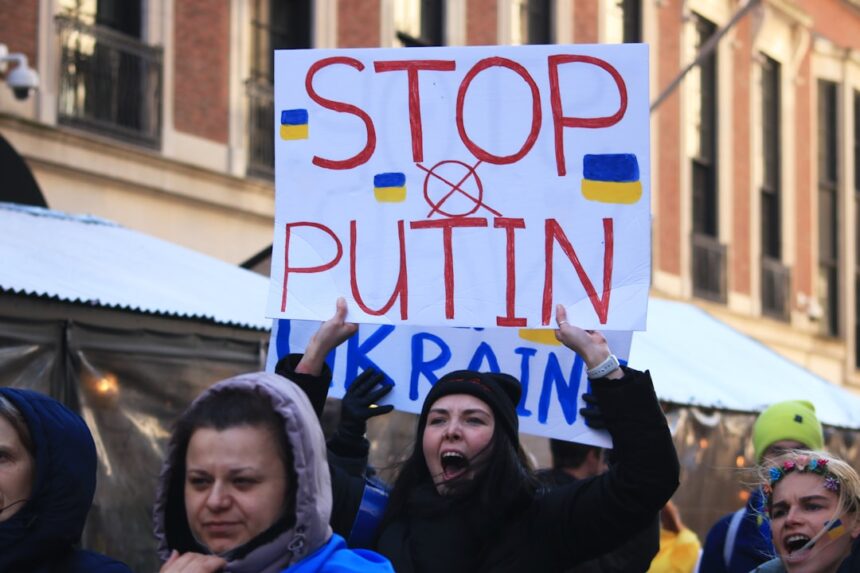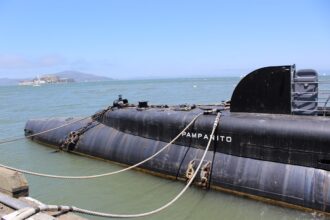In the complex landscape of global energy politics, Russia’s natural gas reserves have emerged as a formidable tool of influence, often referred to as a “weapon” in the geopolitical arena. This characterization stems from the strategic importance of natural gas in international relations, particularly in Europe, where many countries rely heavily on Russian supplies to meet their energy needs. The vast reserves of natural gas in Russia, coupled with its extensive pipeline network, have allowed the nation to wield significant power over its neighbors and beyond.
As tensions rise in various geopolitical contexts, the implications of this energy dependency become increasingly pronounced. The concept of using natural gas as a weapon is not merely a theoretical construct; it has been demonstrated in various instances where Russia has leveraged its energy resources to achieve political objectives. This dynamic raises critical questions about energy security, economic stability, and the future of international relations.
As Europe grapples with its reliance on Russian gas, the interplay between energy supply and political maneuvering becomes a focal point for understanding contemporary geopolitics.
Key Takeaways
- Russia uses natural gas as a political weapon to exert influence and leverage over other countries.
- Natural gas plays a crucial role in Russia’s economy, accounting for a significant portion of its export revenue and GDP.
- Russia exports natural gas to Europe and other countries, giving it significant geopolitical influence and control over energy security.
- The supply of natural gas gives Russia political leverage in negotiations and allows it to influence the pricing of natural gas in global markets.
- The impact of Russia’s natural gas weapon on European energy security has led to efforts to diversify energy sources and reduce dependence on Russian gas.
The role of natural gas in Russia’s economy
Natural gas plays a pivotal role in Russia’s economy, serving as one of the primary drivers of national revenue and economic stability. The country possesses some of the largest natural gas reserves in the world, and its state-owned company, Gazprom, is a key player in the global energy market. The revenues generated from natural gas exports significantly contribute to the Russian federal budget, funding various public services and infrastructure projects.
This economic reliance on natural gas creates a symbiotic relationship between the state and its energy resources, reinforcing the importance of maintaining control over these assets. Moreover, the natural gas sector is not only vital for economic sustenance but also for employment and technological development within Russia. The industry supports thousands of jobs and fosters advancements in energy technology and infrastructure.
As such, any fluctuations in global demand or shifts in energy policy can have profound implications for the Russian economy. The interdependence between natural gas production and economic health underscores the strategic significance of this resource in shaping Russia’s domestic and foreign policies.
Russia’s natural gas exports to Europe and other countries

Russia’s natural gas exports are predominantly directed towards Europe, which has historically been one of its largest markets. The continent’s energy landscape is characterized by a heavy reliance on Russian supplies, with countries like Germany, Italy, and France being major importers. This dependence has been cultivated over decades through long-term contracts and the establishment of extensive pipeline networks, such as Nord Stream and Yamal-Europe.
These pipelines not only facilitate the flow of gas but also symbolize Russia’s deep-rooted connections with European economies. In addition to Europe, Russia has been expanding its natural gas exports to other regions, including Asia. The Power of Siberia pipeline, which connects Russia to China, represents a significant shift in export strategy as Moscow seeks to diversify its customer base amid growing tensions with Western nations.
This pivot towards Asia highlights Russia’s adaptability in navigating global energy markets while simultaneously reinforcing its position as a key player in the international arena. The dual focus on Europe and Asia illustrates the complexities of Russia’s export strategy and its implications for global energy dynamics.
Political leverage through natural gas supply
| Country | Natural Gas Reserves (tcf) | Annual Natural Gas Production (bcm) | Major Natural Gas Exporters |
|---|---|---|---|
| Russia | 1,688 | 690 | Europe, China |
| Iran | 1,201 | 240 | Turkey, Iraq |
| Qatar | 866 | 175 | Asia, Europe |
| United States | 430 | 860 | Mexico, Canada |
The ability to control natural gas supplies provides Russia with substantial political leverage over its neighbors and trading partners. By manipulating supply levels or altering pricing structures, Russia can exert pressure on countries that rely heavily on its energy resources. This tactic has been employed in various instances, such as during disputes with Ukraine, where gas supplies were cut off as a means of exerting influence.
Such actions serve to underscore the vulnerability of nations dependent on Russian gas, creating a power imbalance that can be exploited for political gain. Furthermore, this leverage extends beyond immediate neighbors to encompass broader geopolitical relationships. For instance, by offering favorable pricing or supply guarantees to certain countries, Russia can strengthen alliances while isolating others.
This strategy not only enhances Russia’s standing on the global stage but also complicates the energy security strategies of European nations that seek to reduce their dependence on Russian supplies. The intricate interplay between energy supply and political maneuvering illustrates how natural gas has become a critical instrument in Russia’s foreign policy toolkit.
Pricing and negotiation tactics
Pricing strategies employed by Russia in its natural gas exports are often characterized by a combination of long-term contracts and spot market transactions. Long-term contracts provide stability for both suppliers and consumers but can also lock countries into unfavorable terms if market conditions change. Russia has historically used these contracts to secure favorable pricing structures that benefit its economic interests while ensuring a steady flow of revenue.
However, as global energy markets evolve, there is increasing pressure for more flexible pricing mechanisms that reflect real-time market conditions. Negotiation tactics play a crucial role in shaping these pricing dynamics. Russia often leverages its position as a dominant supplier to negotiate terms that favor its interests, sometimes using threats of supply disruptions as a bargaining chip.
This approach can create tension between Russia and its customers, particularly when disputes arise over pricing or contract terms. As European nations seek to diversify their energy sources and reduce reliance on Russian gas, the negotiation landscape is likely to become more complex, with both sides navigating a delicate balance between economic necessity and political considerations.
Impact on European energy security

The reliance on Russian natural gas has significant implications for European energy security. Many European countries find themselves vulnerable to supply disruptions or price fluctuations that can arise from geopolitical tensions or market volatility. This dependency raises concerns about the stability of energy supplies during crises, prompting discussions about the need for greater diversification and resilience within the European energy landscape.
The potential for Russia to use its gas supplies as leverage creates an environment of uncertainty that can hinder long-term planning and investment in alternative energy sources. In response to these challenges, European nations have begun exploring various strategies to enhance their energy security. Initiatives aimed at increasing interconnectivity between national grids, investing in renewable energy sources, and developing liquefied natural gas (LNG) infrastructure are gaining traction.
These efforts reflect a growing recognition that reducing dependence on Russian gas is essential for safeguarding national interests and ensuring a stable energy future. However, achieving this goal requires coordinated action among member states and significant investments in infrastructure and technology.
Alternative energy sources and diversification efforts
As concerns about reliance on Russian natural gas mount, European countries are increasingly turning to alternative energy sources as part of their diversification efforts. Renewable energy technologies such as wind, solar, and hydroelectric power are being prioritized as viable alternatives to fossil fuels. The European Union has set ambitious targets for reducing greenhouse gas emissions and transitioning towards a more sustainable energy system, which aligns with the goal of decreasing dependence on Russian gas.
In addition to renewables, there is also a growing interest in developing domestic sources of natural gas through shale extraction or other means. Countries like Poland and Lithuania are exploring options for increasing their own production capabilities while simultaneously seeking partnerships with other suppliers outside of Russia. These diversification efforts are not only aimed at enhancing energy security but also at fostering greater resilience against potential supply disruptions from any single source.
The geopolitics of natural gas pipelines
The geopolitics surrounding natural gas pipelines is a critical aspect of understanding Russia’s influence in the global energy market. Pipelines serve not only as conduits for energy transport but also as symbols of political power and strategic alliances. The construction of new pipelines often involves complex negotiations between multiple countries, each vying for favorable terms that align with their national interests.
In this context, pipelines can become flashpoints for geopolitical tensions, particularly when they traverse contested territories or involve rival nations. Russia’s extensive pipeline network has allowed it to establish strong ties with certain countries while simultaneously creating friction with others. For instance, projects like Nord Stream 2 have faced significant opposition from Eastern European nations concerned about increased Russian influence in their regions.
Conversely, countries that benefit from transit fees or secure access to Russian gas may support these initiatives as a means of bolstering their own economies. The intricate web of relationships formed through pipeline politics underscores the importance of energy infrastructure in shaping international relations.
Implications for global energy markets
The dynamics of Russia’s natural gas exports have far-reaching implications for global energy markets. As one of the largest suppliers of natural gas worldwide, any shifts in Russian production levels or export strategies can reverberate throughout international markets, affecting prices and availability for consumers across the globe. The interplay between supply and demand is particularly sensitive in times of geopolitical tension when uncertainties surrounding Russian exports can lead to price spikes or supply shortages.
Moreover, as countries seek to diversify their energy sources away from Russian gas, new opportunities may arise for alternative suppliers such as the United States or Qatar to fill the void left by reduced Russian exports. This shift could lead to increased competition among suppliers and potentially reshape global trade patterns within the energy sector. The evolving landscape highlights the interconnectedness of national interests and market dynamics in determining the future trajectory of global energy markets.
Responses from European countries and the European Union
In light of the challenges posed by reliance on Russian natural gas, European countries and the European Union have begun implementing various strategies aimed at enhancing energy security and reducing dependency on Russian supplies.
These efforts reflect a collective recognition that addressing energy security requires coordinated action at both national and EU levels.
Additionally, individual countries have taken steps to diversify their energy sources by seeking alternative suppliers or investing in domestic production capabilities. For example, nations like Germany have increased their focus on renewable technologies while simultaneously exploring partnerships with other gas-producing countries to secure additional supplies. These responses illustrate a growing commitment among European nations to mitigate risks associated with over-reliance on any single source of energy.
Future outlook and potential challenges
Looking ahead, the future of Russia’s natural gas weapon remains uncertain amid evolving geopolitical dynamics and shifting market conditions. While Russia will likely continue to leverage its vast reserves for political gain, increasing efforts by European nations to diversify their energy sources may challenge this strategy over time. The transition towards renewable energy technologies presents both opportunities and challenges for all stakeholders involved in the global energy landscape.
However, potential challenges remain on the horizon as geopolitical tensions persist and market volatility continues to shape supply-demand dynamics. The interplay between national interests, technological advancements, and environmental considerations will play a crucial role in determining how effectively countries navigate these complexities moving forward. Ultimately, the future trajectory of Russia’s natural gas weapon will depend on how well nations adapt to changing circumstances while balancing economic needs with broader geopolitical realities.
In the ongoing geopolitical landscape, the strategic use of natural resources as a tool of influence has become increasingly apparent. A prime example of this is how Russia weaponizes natural gas to exert pressure on other nations, leveraging its vast energy reserves to gain political and economic advantages. For a deeper understanding of this complex issue, you can explore a related article on the topic by visiting In The War Room. This resource provides insightful analysis and context on how energy dependencies can shape international relations and the potential implications for global stability.
WATCH THIS! The FSB’s Hidden War on Europe’s Pipelines
FAQs
What is natural gas weaponization?
Natural gas weaponization refers to the use of natural gas as a political tool to exert influence, pressure, or control over other countries. This can be done through manipulation of supply, pricing, or infrastructure.
How does Russia weaponize natural gas?
Russia has been known to weaponize natural gas by using its dominant position as a supplier to Europe to exert political influence. This includes using gas supply as a tool for political leverage, imposing pricing and contractual terms, and using energy infrastructure projects as geopolitical tools.
What are the implications of Russia’s weaponization of natural gas?
The weaponization of natural gas by Russia has significant geopolitical implications, including potential energy security concerns for European countries, as well as the potential for increased political influence and control by Russia in the region.
What measures are being taken to counter Russia’s weaponization of natural gas?
European countries have been working to diversify their energy sources and reduce dependence on Russian natural gas. This includes investing in renewable energy, increasing liquefied natural gas (LNG) imports, and developing energy infrastructure to connect to alternative sources of gas.
Is natural gas weaponization unique to Russia?
While Russia has been a prominent example of natural gas weaponization, other countries have also used natural gas for political purposes. This includes countries in the Middle East and North Africa using natural gas as a tool for political influence and control.




